Posted : December 7, 2022
Our blog is chock full of great ideas for fun things to see and do in York Durham and Headwaters. We are always adding new content and updating old posts, but sometimes you might stumble upon something from our vault. If this article has inspired you to hit the road, be sure to double-check that the featured stops in this post are still welcoming visitors.
York Durham Headwaters is the home of rural Ontario! Hands down, and we challenge you to prove us wrong. Our strongest asset when it comes to local food, the reason that people travel here from throughout the GTA and beyond, is our network of wholesome family farms. These are the farmers who are passionate about what they do, who are raising their families on the land so that our families can thrive with the pleasures of local flavours. So, whenever we have the opportunity, you can bet your parsnips that we at YDH will be here, singing their praises.
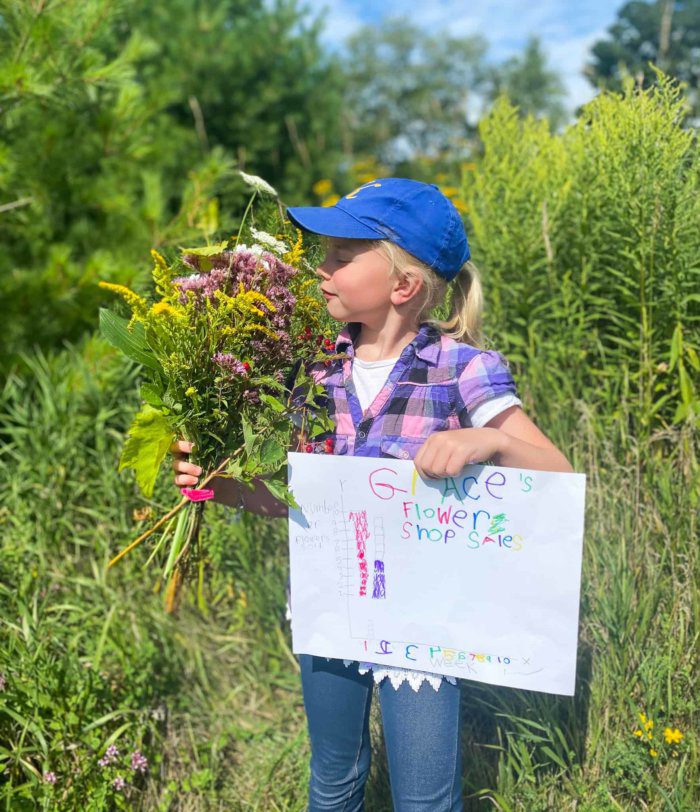
Kendal Hills Farm in Clarington is one of our family-run farms, owned and operated by Dave Kranenburg and Emily Tufts and located just outside of Orono. Not only does it have a unique story, but it grows a unique product as well: mushrooms! Come with us as we sing their praises, and be sure to read all the way to the end for a nourishing, delicious mushroom soup recipe that will warm the cockles of your heart along with your belly. It’s perfect for these cold YDH-winter months.
All About Kendal Hills Farm
Dave is entering his sixth season of being a farmer. But for his partner Emily, this way of life is not novel. She grew up on a farm—in fact, she grew up on the Kendal Hills Farm. In the 1980s, her parents moved here to run a gamebird operation. “It was a fairly large-sized operation,” Dave explains. “They were raising pheasant, quail, and partridge on what was, at the time, a hunting reserve. It was also a dog kennel, and the idea was that people would come to the farm and hunt gamebirds.” As demand for farmed game hunting dwindled through the 1990s, the farm migrated away from this model towards the more familiar animal and crop farming that we know today.
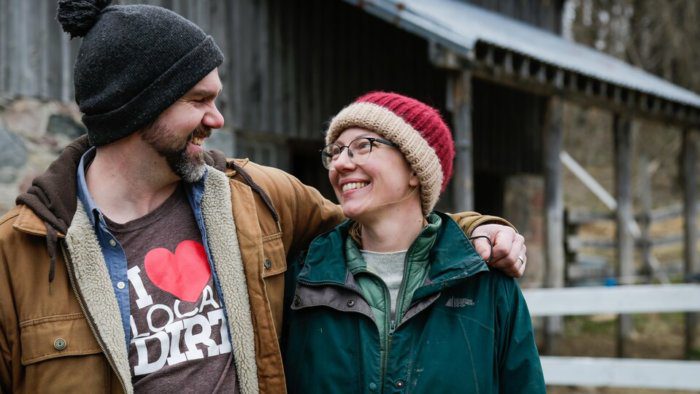
When Dave and Emily moved with their children to the farm six years ago to join Emily’s parents, Kendal Hills became a three-generation farm. “Emily’s parents were ready to retire, and were considering selling the land,” Dave recalls. “We didn’t want to see this land go. It’s just too beautiful. So, we decided to see what we could do with it, and I went to work figuring out how to become a farmer and what that would look like while Emily continued her full-time off-farm job.”
Today, the day-to-day farm work falls to Dave—which is a big change from his previous positions with a non-profit organization in Downtown Toronto, and as the executive director of a national food charity. But even before Dave became a farmer, he had been interested in food. In particular, what a sustainable food system looks like. It is this interest that he has brought to the land and to his philosophy of how to manage Kendal Hills’ 70 acres, most of which is comprised of forested area and rolling hills. “I’ve always had a strong interest in food,” he says, “but now I’m finally getting my boots dirty. I love the change. I find farming is full body and mind work. You’re moving, you’re thinking. It’s great!”
Today, Kendal Hills raises two varieties of meat chicken—conventional and a heritage breed. They also have heritage laying hens, and raise ducks and turkeys free-range on pastures. Because their land backs onto the Ganaraska Forest, Dave and Emily are engaged in planting trees and establishing a farm that works with the forest—a type of farming that is known as agroforestry. “We are starting to raise livestock in the forest,” Dave says. “All of the pastures that were slightly overgrown, we are starting to plant trees there so that we will eventually have lots of shade, lots of wind break, and fruit and nuts for the animals to eat.”
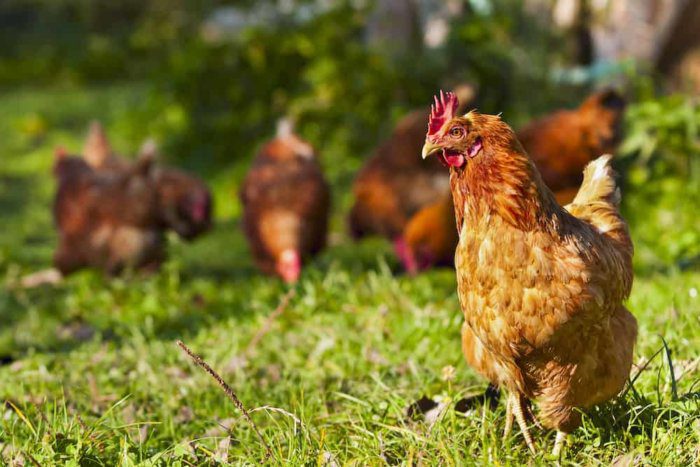
It’s a unique concept that you don’t see on a family farm everyday. But what’s even more unique about Kendal Hills is a particular crop they grow: mushrooms. In trying to figure out what to do with one particular outbuilding that, as Dave says, was “quite literally about to fall down—a tree had even grown into the side of it,” the couple landed on mushrooms as a possibility. “The more I learned about them, the more interested I became,” he recalls. “When we think about the typical mushroom, we’re thinking about the fruit. But the mushroom itself is a network organism that we don’t see when we see the fruit coming out of the ground. I was quite fascinated by that. And also, we were trying to differentiate ourselves from the other farms at all the markets. So mushroom farming fit in with our philosophy of growth and with working with the forest. It spoke to me on a symbolic level and on an opportunity level.”
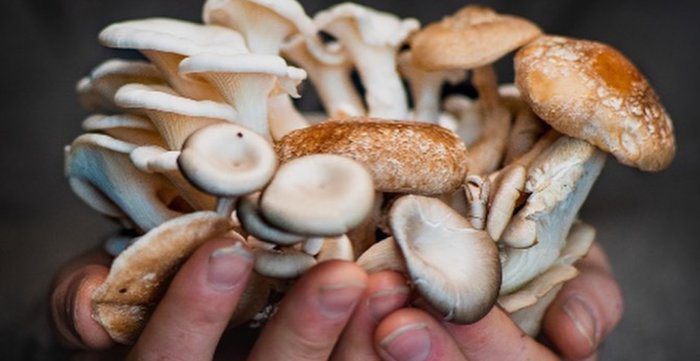
To produce mushrooms year-round, Dave and Emily have converted their outbuilding to support all-season growing, and work with their natural surroundings to optimize cultivation. “We grow them indoors mainly to keep the pests off,” Dave explains. “There are a lot of insects that love mushrooms. There is no air-conditioning in the building, and there’s a heater just to keep the waterline from freezing. But otherwise, that’s it. We work with the outdoor air temperature and humidity to grow nine different types of mushrooms that change through the seasons.” To be even more environmentally conscious, the mushrooms are grown on sawdust, and this, together with the animal manure they produce, are turned into compost which assists Dave and Emily with their tree-planting efforts.
Graze and Gather
In addition to Kendal Hills Farm, Dave and Emily founded and operate a sister company, Graze and Gather, which is a virtual farmers market that people can purchase from online. In the first days of the pandemic, even before Ontario announced its first lockdown in March, Kendal Farms felt the impact of COVID-19. At the time, they were operating a dog boarding kennel as well, and found that people were cancelling their bookings because they were cancelling their travel plans. Restaurants were cancelling their orders, farmers markets were closing, and they like other family farms were facing uncertainty about where their revenue was going to come from. This is how the idea of an online farm store came to be. But instead of just Kendal Hills food, Dave and Emily have invited their fellow family farmers to join and list their food, too.
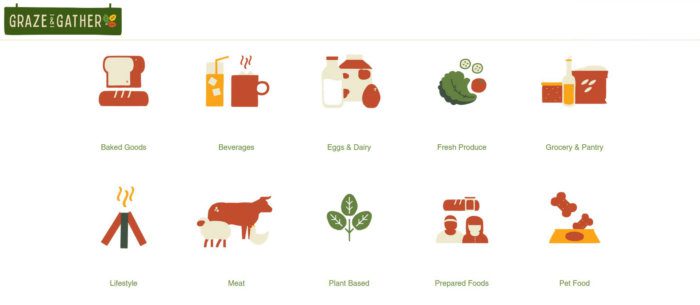
“It took off in a big way,” Dave recalls. “We were opening at noon on Thursday, and we were sold out within 15 minutes. It was just ridiculous how quickly it was going. We are feeding about 1,000 homes on a regular basis. We source food from about 100 small farms and producers, and we deliver to those 1,000 homes as well as restaurants and grocers. Or you can come pick your produce up from our farm. Essentially, we take on the distribution and sales for small farms so that somebody can place one order, but get amazing food from hundreds of different growers.”
“I think small, local farms are producing the best food in the province,” he adds. “They’re raising different varieties, they’re raising them in different ways, and you can taste the quality—whether it’s an apple, a mushroom, a chicken, a beet or a tomato. I encourage everybody to go out and experience the diversity of food being grown in their own backyard.”
For more information and to place your order for delicious, locally-grown food (including amazing varieties of mushrooms!), visit Dave, Emily and their farming friends online at www.grazeandgatherfood.ca.
Kendal Hills Farms Mushroom and Vegetable Soup
This delicious Mushroom and Vegetable Soup from Kendal Hills is a plant-based meal that will warm your belly in these cold winter months, and delight your tastebuds with the complex flavours of different varieties of mushrooms grown right here in YDH.
Prep time: 30 minutes
Cook time: 1 hour
Serves: 6
Ingredients
- 4 cups homemade or high-quality vegetable stock
- 2 large onions
- 4 large carrots
- 4 ribs celery
- 2 cloves garlic
- 1 large leek, white and pale green parts only
- 1 large sweet potato
- 1 ½ to 2 pounds fresh Kendal Hills mushrooms
- Blue, brown, white and golden oyster
- Cinnamon cap
- Shiitake
- Abalone
- 1 ½ to 2 cups dried mushrooms and 4 cups boiling water for soaking
- Shiitake
- Oyster
- 1 tbsp dried thyme
- 1 tbsp dried rosemary (crushed in a mortar)
- 1 tbsp herbes de Provence
- Salt and pepper to taste
Directions
- Place the dried mushrooms in a large glass bowl and pour 4 cups boiling water over top of them. Allow to sit for at least 30 minutes in the hot water while you prepare the soup.
- Heat a large soup pot on medium heat; add oil of your choice.
- Chop onions, celery and carrots to a medium dice; add 1 tsp each of salt and pepper. Stir to soften, about 5 minutes.
- Finely mince the garlic and add to the aromatics, stirring.
- Slice the leeks in half lengthwise and rinse under cold water to clean off any dirt of grit, then slice crosswise, about ¼ inch thick. Add to the pot, stir to soften, about 5-7 more minutes.
- When the aromatics are soft and starting to release liquid, add dried herbs and stir to combine.
- Peel and chop the sweet potato into 1-inch cubes, add to the pot and stir to combine. Cook on medium-low for about 5-10 minutes while you prepare the mushrooms.
- Trim and chop the fresh mushrooms, including the stems. Large shiitakes can be chopped into cubes, aim for 1-inch pieces. Oysters can be roughly chopped or torn by hand. Cinnamon caps can be cut in half or left as whole caps, but their woody stems should be chopped up into ½-inch pieces. Don’t discard the stems—they add so much flavour to the soup!
- Add fresh mushrooms to the pot and stir to combine. Allow to cook 2-3 minutes.
- Add the dried mushrooms and the soaking liquid to the pot. Add the vegetable stock and stir to combine.
- Bring to a boil and reduce heat to low. Simmer for 1 hour or longer until veggies are tender.
- Taste the broth and season with salt and pepper to taste.
- Serve and enjoy!